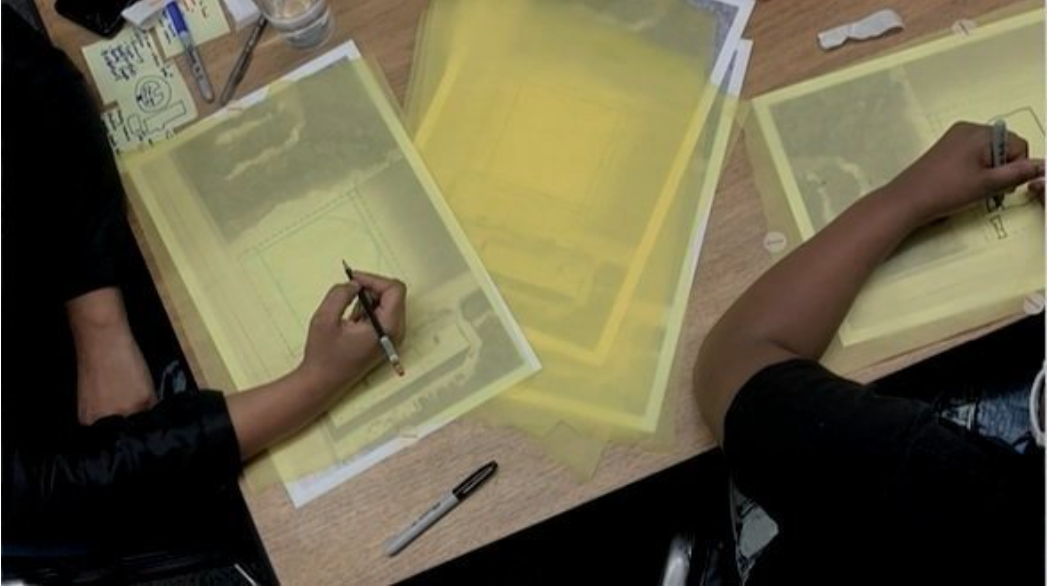Recapping Our Fall City Builders Design Workshop; Spring Registration Now Open
Did you know that a well-designed place enhances your health?
Storefront for Community Design is excited to launch our City Builders Design Workshop this spring. We are seeking youth and young adults ages 13 -18 who are inspired by real world projects that make positive change in their neighborhoods. Come research, discover, and design resources with us this spring!
Are you inspired by design and creativity?
Are you passionate about health and wellness?
Are you interested in innovative ways to create change in your community?
Become A City Builder!
Want to learn more about Storefront’s Design Education?
Learn more about our Fall ‘21 Session on Food Access
When the pandemic began, Storefront for Community Design and community partners at Six Points Innovation Center (6PIC) pivoted programming to virtual school and distributing and delivering food to it’s youth residents in the City of Richmond. Due to public school closures many students were learning virtually from home which also meant youth were eating at home rather than at school. Storefront partnered with Richmond Public Schools to make 6PIC a hub for families to make it more accessible for our youth and their families to receive pertinent school information and resources. During this time many families and youth became more aware of the limited access to healthy food in the city.
In September of 2021, schools reopened and not even a month after … Richmond we have a problem. Parents expressed their concerns about the school meals being provided to their students. The Richmond Times Dispatch reported that parents weren’t happy with the meals provided to their students and petitioned the school board to find out what was going on. At the same time our Youth Innovation Director, Kai Banks, was preparing to restart the City Builders Design program, heard the concerns from teachers and parents and thought, “what about our students?”
“I wanted to know what our students were experiencing, teach them more about how the school and food system worked, and empower them to think creatively and design solutions. Fresh off of working in the community around food access concerns in general it seemed only right to focus our attention on food access in our community.”
Residential Security Map, Visit To City Hall’s Observatory Deck
With Kai’s knowledge of the history of Richmond and redlining, she understood the results that it had created, food deserts. According to the Richmond 300 insights report, food deserts are areas in which there is a lack of fresh and healthy food options within a reasonable, convenient distance. Normally, these food deserts are full of fast food restaurants and convenience-type stores but are lacking grocery stores or supermarkets. Some typical methods traditionally used to try and eliminate these deserts are: improvements to the business climate, more participation in WIC(Women, Infants, and Children) or SNAP(Supplemental Nutrition Assistance Program) programs, increased public transit in order to take people to the food, increased education about healthy food choices in public schools, and partnering with nonprofits to affect policy change at a state or federal level.
The City Builders Design program is designed to teach youth residents about urban planning and design. It is used to educate them on how cities work and plan for the future, while looking at historical events that created the conditions that cities are today. At the end of the program, youth work together to design a solution to the challenges that they feel is impacting their communities.
Breathing Places Exhibit At The Valentine Museum
The semester began in October with an observation and discovery period. During this period students conducted a community planning analysis for the Northside, visited urban gardens and food locations in the area, and surveyed community members. Their findings revealed that 3 out 5 students did not have access to transportation. They also discovered that there weren’t any major grocery stores within a 5 mile radius of 6PIC. The students also discussed school lunches and their own likes and dislikes.
The second half of the semester students learned from experts in their prospective fields around land use, policy, and urban planning. The speakers ranged from Ebony Walden, an urban planner, Richmond Food Justice Alliance, a community organization, and Maggie Walker Community Land Trust, a housing non-profit in the city. City Builders’ participants went on a field trip to the Valentine Museum and City Hall observation deck to learn more about the historical context of green spaces and other development in the city of Richmond. Lastly, the students had an opportunity to visit VCUart’s mOb studio students and engage in the design process.
City Builders Design Concept for Northside Healthy Food Map
In the final weeks, City Builders’ participants collaborated with a design professional to create a vision for a North Side food access map for residents to be able to locate urban gardens, smaller markets/stores that provided healthy food access, and community pantries in the area. By the end of the semester they learned that the school's meal selection had some to do with nutrition and a lot to do with policies on the state level. One of the students even expressed she was ready to speak with the Virginia Department of Education to advocate for meals in schools!
Are you a designer interested in helping our City Builders create a final version of their map? Please feel free to email hello@storefrontrichmond.org.
About City Builders Design Workshop
The vision of the City Builders program is to engage the next generation of designers and grow urban youth leaders and equip youth for career success, civic engagement, and creative expression. The program focuses on real world projects in the built environment and encourages youth ages 13-18 to research, discover, and design resources for community members across Richmond. City Builders advances civic power through place-making projects and neighborhood-based skill building in program areas.




